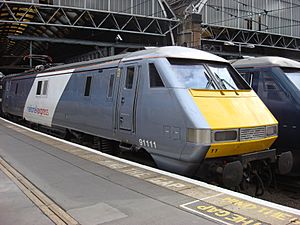British Rail Class 91 facts for kids
Quick facts for kids British Rail Class 91 |
|
 |
|
| 91111 at King’s Cross station, London | |
| Power type | Electric |
|---|---|
| Builder | BREL |
| Build date | 1988–1991 |
| Total production | 31 |
| Configuration | Bo-Bo |
| UIC classification | Bo'Bo' |
| Gauge | 1,435 mm (4 ft 8 1⁄2 in) |
| Length | 63 ft 8 in (19.41 m) |
| Locomotive weight | 84 tonnes (83 long tons; 93 short tons) |
| Electric system(s) | 25 kV AC |
| Current collection method | Pantograph |
| Top speed | Design: 140 mph (225 km/h) Service: 125 mph (201 km/h) |
| Locomotive brakes | Air |
| Locomotive brakeforce | 45 long tons-force (450 kN) |
| Train brakes | Air |
| Career | British Rail GNER National Express East Coast |
| Number | 91001–91031; later 91101–91122, 91124-91132 |
The British Rail Class 91 is a very fast electric locomotive. These trains can reach speeds of 140 mph (225 km/h). They were specially made for the East Coast Main Line in the UK. This was part of a big plan in the late 1980s to make the railway line modern and use electricity.
The Class 91 trains were built to take over from the older Class 43 trains. These older trains were also known as the InterCity 125. The new Class 91s were given the extra name InterCity 225. This name showed they were a newer, faster version of the 125. It also hinted at their top speed of 225 km/h.
A full InterCity 225 train set has a Class 91 locomotive at one end. At the other end, there is a special carriage called a Driving Van Trailer. This carriage looks very similar to the Class 91 locomotive.
Contents
What Makes Class 91 Special?
The Class 91 locomotives are powerful electric trains. They get their power from overhead electric lines. This makes them very efficient and fast.
Designed for Speed
These trains were designed to be very quick. Their top speed of 140 mph (225 km/h) made them some of the fastest trains in the UK. They helped reduce travel times on the East Coast Main Line.
How They Get Power
Class 91 trains use a special arm on their roof called a pantograph. This arm touches the overhead electric wires. It collects 25,000 volts of alternating current (AC) electricity. This power then drives the train's motors.
Unique Design Features
The Class 91 has a special design. One end of the train is pointed and sleek. This helps it cut through the air easily when going fast. The other end is flatter, which is where the train can connect to the Driving Van Trailer.
Where Do Class 91 Trains Run?
Class 91 trains have mainly operated on the East Coast Main Line. This important railway line connects London with cities in the north, like Leeds, Newcastle, and Edinburgh.
Operators Over Time
When they were first built, the Class 91s were used by British Rail. Later, different train companies took over. These included GNER and National Express East Coast. They continued to use these reliable and fast trains for passenger services.
Images for kids
-
A Class 90 (90050) and a Class 91 (91020) under construction at Crewe Works in 1990
-
91115 running blunt-end first at London King's Cross
-
Class 91/1, no. 91118 "Bradford Film Festival" at Peterborough on 27 July 2003. This locomotive is painted in GNER blue livery
 | William M. Jackson |
 | Juan E. Gilbert |
 | Neil deGrasse Tyson |






